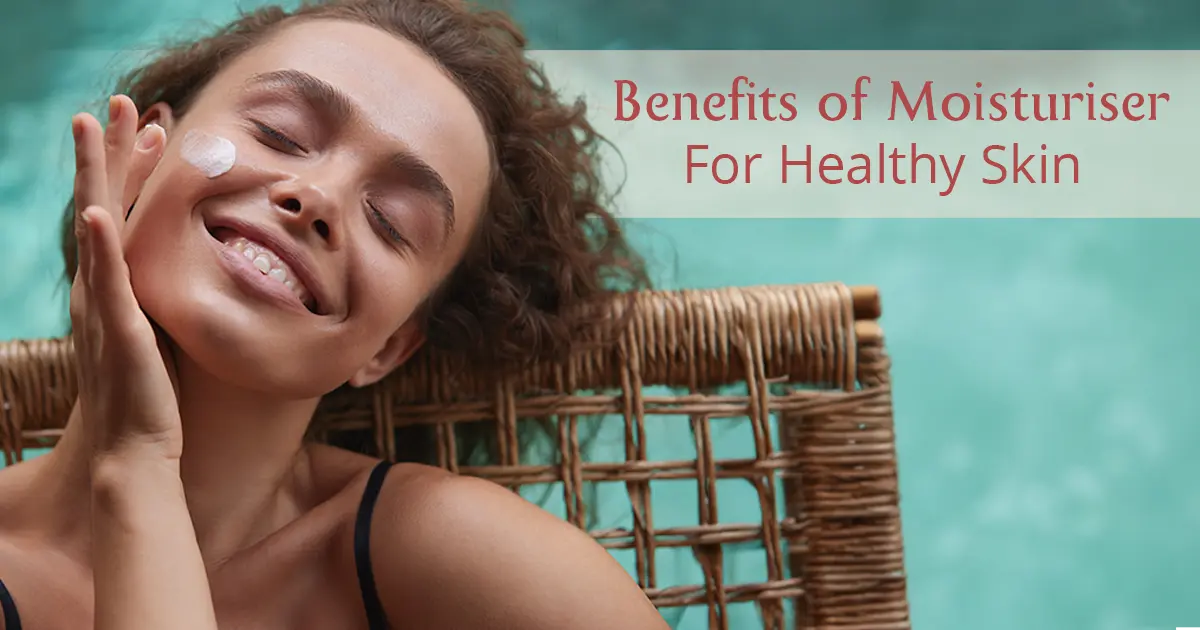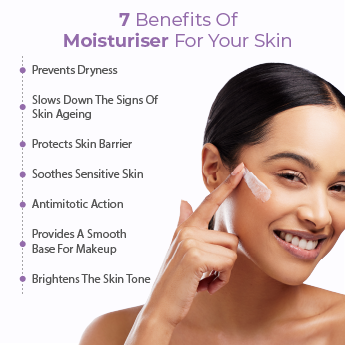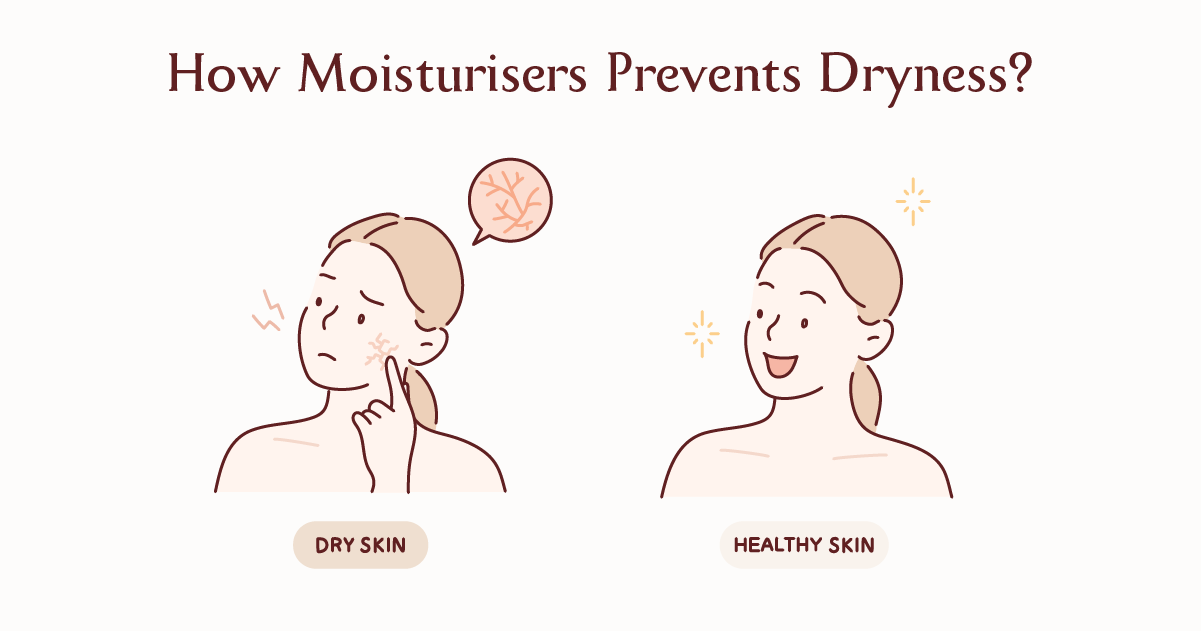
Just like our body needs water to function well, our skin needs adequate hydration too. The skin is our body's largest organ and requires a lot of care to keep it looking and feeling its best. So, how do you plan to hydrate your skin so that it appears glowing and healthy? Well, besides drinking enough water, using the right moisturiser is the key. Moisturising is a basic step in the skincare routine.1 Many of you, perhaps, must be overlooking its advantages and skipping it because your skin feels greasy. But after reading this blog and learning about the numerous benefits of moisturisers, you won’t be able to skip them anymore!
Let’s explore what moisturisers are, the different types available, their top 7 benefits, and how to choose and use the right one for your skin. Ready?
What Is A Moisturiser?
Moisturisers are more than just hydrators - they're a powerful tool in maintaining skin health and treating various skin conditions like eczema, xerosis, lichen simplex, etc. By locking in moisture and delivering potent ingredients like vitamins, antioxidants, and peptides, moisturisers help restore the skin's natural barrier function, soothe dryness and inflammation, and reveal a radiant, healthy complexion. There is more to the list. We will learn about the benefits of moisturisers in detail, but before that, let’s have a look at their types. 1 2 3
Types of Moisturisers
Moisturisers can be divided into three main categories based on their functions. 1 2 4
1. Occlusive Moisturizers
Occlusive moisturisers work by forming a physical barrier on the skin's surface. They comprise oils and waxes that prevent water evaporation and reduce transepidermal water loss (TEWL). This barrier allows the skin's deeper layers to replenish moisture in the outer layer, helping to hydrate and protect the skin. 1 2 4
Petrolatum is one of the best examples of an occlusive moisturiser that effectively reduces water loss from the skin’s surface by approximately 99%. Other effective occlusive moisturisers include. 1 2 4
Hydrocarbons: Petrolatum, mineral oil, paraffin, squalene
Silicones: Dimethicone
Vegetable oils: Coconut oil, castor oil, olive oil, grape seed oil, soybean oil
Animal Fats: Mink oil, emu oil, lanolin
Wax Esters: Lanolin, beeswax
Sterols: Cholesterol, ceramides
2. Humectants
Humectants are low molecular substances that attract and bind water into the stratum corneum, helping to retain moisture in the skin. Often used in combination with other compounds, humectants play a crucial role in maintaining skin hydration. 1 2 4
Key Humectant Molecules:
- Alpha-hydroxy acids (AHAs), such as glycolic and lactic acids. They promote desquamation, improve barrier function, and increase ceramide levels.
- Urea, a natural component of the skin's natural moisturising factor (NMF). It enhances water absorption, promotes desquamation, and improves skin barrier function.
- Glycerin is another commonly used humectant. It attracts and binds water, supporting barrier repair. 1 2 4
3. Emulsifiers
Emulsifiers are a crucial component of moisturisers, enabling the mixing of two or more immiscible substances into a single, stable phase. These molecules typically consist of long carbon chains with a polar group, allowing them to bridge the gap between oil and water. 1 2 4
Commonly Used Emulsifiers:
- Fatty acids, such as stearic acid
- Saturated and unsaturated hydrocarbons of varying lengths
7 Benefits Of Moisturiser For Your Skin

1. Prevents dryness

Daily exposure to weather, air conditioning, and hot showers strips your skin of moisture. Several other environmental factors can make your skin dry. This is where a moisturiser steps in. It helps restore skin hydration and prevents flakiness and irritation. 5
2. Slows down the signs of skin Ageing
Dry skin can accelerate signs of ageing, leading to sagging, fine lines, wrinkles, dullness, and rough texture. As we age, our natural production of hyaluronic acid and other moisturising compounds declines. Using a face moisturiser can help counteract these effects, visibly reducing signs of ageing and restoring skin's bounce, plumpness, and volume. 1 4 6
3. Protects Skin Barrier
Maintaining your skin’s natural moisture barrier is essential for keeping the skin healthy & protected. But external agents like irritants & germs might disrupt this barrier. A moisturiser forms a protective barrier to seal and restore natural moisture produced by your skin. 1 2
4. Soothes Sensitive Skin
When the skin is dry, it’s common to develop rashes, skin redness & itchiness due to the sensitive nature of the skin. This is when a good moisturising cream can work its magic. It can improve skin hydration & reduce the appearance of skin redness, effectively calming your little one’s skin. 4
5. Antimitotic Action
Some moisturisers with mineral oils can help slow down the rapid growth of skin cells. This can be beneficial for skin conditions like psoriasis, where skin cells grow too quickly and cause inflammation. 4
6. Provides a Smooth Base for Makeup
We usually apply primers on the face before starting any makeup, right?. This is done to lock in the moisture, letting makeup glide smoothly. Because a well-moisturised skin surface provides a smooth canvas for makeup. This allows makeup to glide more evenly and last longer.
7. Brightens The Skin Tone
A few selected moisturisers contain certain skin brightening ingredients like saffron extracts, which help in combating hyperpigmentation (skin darkening) in your skin. These can not only help regulate the melanin (the pigment responsible for skin pigmentation) production but also brighten & even out their skin tone. 7
How To Choose The Right Moisturiser For Your Skin?
Not all moisturisers work the same for every skin type. Therefore, you need to pick the right one that matches your specific needs and can make a significant difference in keeping your skin balanced and glowing.
1. For Dry Skin
If you have dry skin, look for moisturisers that are rich and deeply nourishing. Try ingredients such as shea butter, ceramides, and glycerin. They help restore the skin’s barrier and lock in moisture. Avoid lightweight or gel-based formulas, as they often don’t provide enough hydration. Creams or ointments with a thicker consistency are best for sealing in moisture and combating dryness. 2
2. For Oily Skin
Oily skin doesn’t mean you have enough hydration. It still needs to be hydrated; the catch is to pick the apt one! Opt for a lightweight, oil-free moisturiser that won’t clog pores or contribute to breakouts. Ingredients like hyaluronic acid and glycerin are ideal, as they hydrate without adding extra shine. A gel-based moisturiser can be a great option since it absorbs quickly and feels weightless on the skin. 2
3. For Combination Skin
Combination skin requires a careful balance. Choose a light, oil-free moisturiser that provides enough hydration without making oily areas greasy. Look for a blend of humectants (like glycerin) and occlusives (like dimethicone) to ensure moisture retention while keeping pores clear. 2
4. For Sensitive Skin
Sensitive skin needs extra gentle care. Select a fragrance-free and hypoallergenic moisturiser that reduces the risk of irritation. You can go for soothing ingredients such as aloe vera and chamomile that calm the skin. 2
How To Use A Moisturiser?
For Face:
- Cleanse your face with a gentle cleanser.
- Apply a small amount of moisturiser and massage it in.
- Focus on dry areas like cheeks and forehead.
- Follow up with sunscreen.
For Body:
- Apply moisturiser after showering or bathing.
- Use a generous amount on dry areas like elbows and knees.
- Massage it in until absorbed.
- Reapply as needed throughout the day.
For long-lasting hydration, try our AreoVeda Moisturising Spray Lotion - a specially formulated, gentle, and non-greasy moisturiser. Its unique blend of natural ingredients provides long-lasting hydration for up to 72 hours, soothes acne-prone skin and helps to lock in moisture, leaving your skin feeling soft, supple, and radiant.
When To Use Moisturiser?
You should moisturise twice daily—once in the morning and once at night: 1 8
- Morning: Use a lightweight moisturiser followed by sunscreen.
- Evening: Choose a richer formula to aid overnight skin repair.
Also, moisturise immediately after cleansing or showering, when the skin is still slightly damp, to lock in maximum hydration.
Conclusion
Incorporating a good moisturiser into your daily skincare routine isn’t just about pampering your skin — it’s a powerful step towards long-term skin health. From boosting hydration and preventing dryness to enhancing skin elasticity and creating a protective barrier against environmental damage, the benefits of moisturiser go far beyond surface-level glow. Whether you have oily, dry, or sensitive skin, choosing the right moisturiser can make all the difference. So, don’t skip this essential step — your skin will thank you for it today, tomorrow, and for years to come.







.webp)



